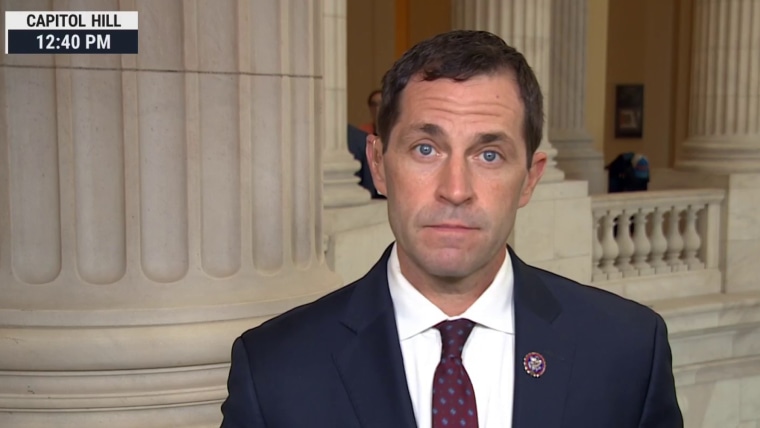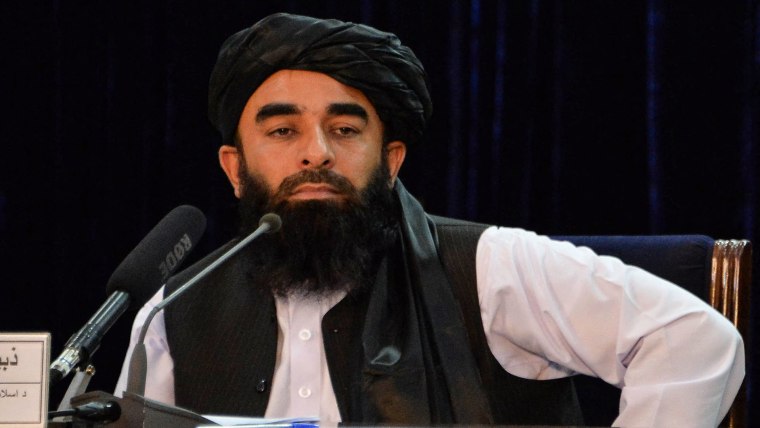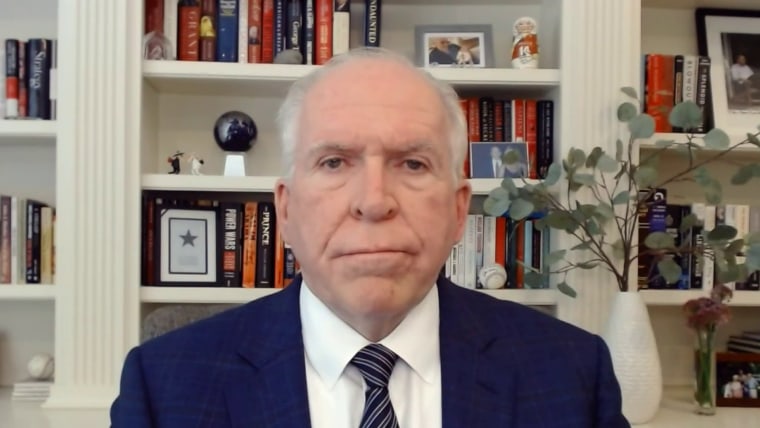WASHINGTON — With President Joe Biden intending to stick to the Aug. 31 deadline for U.S. troops to leave Afghanistan, it's becoming clear that thousands of the Afghans who helped the U.S. won't be evacuated, a scenario that has engendered deep frustration inside U.S. national security agencies.
"People are furious and disgusted," said a former U.S. intelligence official who declined to be quoted by name. A defense official said he grew nauseated as he considered how many Afghan allies would be left behind.
At the CIA, "officers feel a real sense of obligation, moral obligation and personal obligation," to the Afghans they supported and trained, said former CIA Director John Brennan, an NBC News national security consultant.
But the precarious situation for U.S. troops on the ground left President Joe Biden with no good options to extend their presence, military officials said.
An unannounced meeting Monday in Kabul, the Afghan capital, between CIA Director William Burns and the de facto Taliban leader, Abdul Ghani Baradar, appears to have helped speed evacuations, said Sen. Ben Cardin, D-Md., and other U.S. officials. But it didn't prompt a Taliban agreement to tolerate a longer stay for the 6,000 U.S. troops at the airport.
The U.S. proposed to extend the withdrawal date by four days, offering a promise to hand over a functioning airport to the Taliban after cleaning it up and leaving a Turkish staff to run it. But the Taliban refused to entertain any extension, two defense officials said.
The result, U.S. officials said, is that evacuations are likely to slow considerably by Friday to give the military enough time to effect an orderly withdrawal. That isn't nearly enough time to evacuate all the Afghan interpreters, drivers and others who helped the 20-year U.S. effort in the country, and it may not be enough time to remove every American, officials acknowledged.
Republicans expressed outrage even before Biden announced his decision.
"Damn the deadline," said Sen. Ben Sasse, R-Neb., a member of the Intelligence Committee. "Americans want us to stay until we get our people out, and so do our allies. ... Mr. President, tell the Taliban we're getting our people out however long it takes and that we're perfectly willing to spill Taliban, Al Qaeda and ISIS blood to do it."
But defense officials painted a dire picture of how such a fight might play out. Thousands of hardened Taliban fighters surround the Kabul airport, they noted, and U.S. forces could be extremely vulnerable to attack. The U.S. could defend itself from the air, but if a fight broke out, the likelihood of civilian casualties would be high. And at that point, it would be almost impossible for Americans or Afghan allies to get to the airport.
Finger-pointing over what led up to the no-win situation was widespread this week.
Two senior Department of Homeland Security officials familiar with internal administration discussions expressed anger at the State Department for not having acted sooner to ramp up the vetting of Special Immigrant Visa applicants.
A spokeswoman for Customs and Border Protection, or CBP, which is part of DHS, said it is conducting biometric and biographic screening and vetting of Afghans in coordination with other agencies.
One of the DHS officials said their State Department counterparts didn't act sooner because they were hesitant to start a mass evacuation before the Afghan president left, worried that it would show a lack of confidence in Afghan leadership.
There has also been continued frustration that some U.S. government databases weren't immediately compatible between agencies, slowing the vetting in places like Doha, Qatar. CBP planned to increase its vetting staffing in Doha from 14 to 42 between Saturday and Tuesday, according to a document obtained by NBC News.
Meanwhile, officials at non-governmental organizations that have operated in Afghanistan, which have raised millions of dollars from Americans concerned about the fate of Afghans, are growing frustrated with the Biden administration. A leader of an NGO said: "There's been an outpouring. It's inspiring, but on the other hand, it is a damning reflection on the failure of the U.S. that private citizens are having to step in to do what the government with all its billions and trillions has failed to do."
Asked why more vulnerable Afghan citizens hadn't finished the Special Immigrant Visa process sooner, the State Department has pointed fingers at the Trump administration, noting that the agency under Biden started with a backlog of more than 17,000 applicants. State Department officials have also blamed the complex 14-step process mandated by Congress, which was only further complicated by the Covid pandemic and Covid outbreaks at the U.S. Embassy in Kabul.
A senior administration official said Monday that efforts to get vulnerable Afghan citizens out of Afghanistan won't stop after the military departs. "This will remain an around-the-clock, 24/7 effort, both to get those who wish to leave out of Afghanistan and then to continue processing paperwork so Afghans at risk can continue on to the U.S. and to other nations for permanent resettlement," the official said.
Military officials concurred, saying they will keep getting people out for as long as they can. U.S. forces will prioritize lives over equipment, and they will leave equipment behind and blow it up in place, the two defense officials said.
U.S. assets at the airport include artillery, mortars, anti-drone weapons and Mine Resistant Ambush Protected vehicles, which will be destroyed so flights can be filled with people, the officials said.
They added that the Biden administration is considering trying to maintain an embassy presence at the airport — but that senior U.S. military officials oppose that as too difficult to defend.
Concerns mounted, meanwhile, about vetting the Afghans who may end up in the U.S.
Vetting at Hamid Karzai International Airport is complicated by the fact that biometric screening isn't available, according to an internal State Department memo obtained by NBC News. The U.S. mission team reported at least five cases of Afghans who presented U.S. passports that didn't belong to them, according to the Sunday dispatch from the Afghanistan Task Force, highlighting fraud concerns and complicating the process of screening people to enter the airport.
Some of the vetting is happening in third countries. CBP was scheduled to add 27 staff members in Doha to conduct vetting, bringing the total to 42, along with 33 in Germany and 31 in Bahrain, according to a separate internal document obtained by NBC News.
"behind" - Google News
August 25, 2021 at 03:31AM
https://ift.tt/3881hPd
Fury and disgust at CIA, Pentagon, in Congress that thousands of Afghans will be left behind - NBC News
"behind" - Google News
https://ift.tt/2YqUhZP
https://ift.tt/2yko4c8
Bagikan Berita Ini

















0 Response to "Fury and disgust at CIA, Pentagon, in Congress that thousands of Afghans will be left behind - NBC News"
Post a Comment